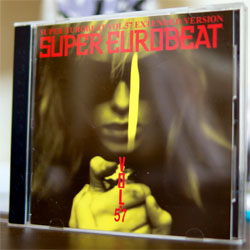
Origin of the term "Eurobeat"
The term "Eurobeat" was first used in the UK when Ian Levine's Eastbound Expressway released their single "You're a Beat" in recognition to the slower tempo of Hi-NRG music emerging from Europe. The majority of Hi-NRG songs tended to be from 124 to 138 BPM whereas the European releases tended to be from 108 to 120 BPM. Many European acts managed to break through under this new recognition, namely the likes of Modern Talking, Bad Boys Blue, Taffy, and Spagna.
It was used commercially to describe the Stock Aitken Waterman–produced hits by Dead or Alive, Bananarama, Jason Donovan, Sonia, and Kylie Minogue which were heavily based on the British experience with Italo disco during holidays in Greece and elsewhere. "Eurobeat" was also applied to the first hits from the Pet Shop Boys and other UK-based dance music and electropop groups of the time.
Those "Eurobeat" hits had a European beat, topped the UK charts, and, in the USA, received radio airplay and contributed to the evolution of New York's Freestyle genre.
"Braun European Top 20" on MTV Europe also aired on MTV USA during summer 1987 to 1989, spreading the UK's Eurobeat sound. But after the summer of 1988 (UK's summer of love), the style lost popularity, with the exception of Kylie Minogue and Jason Donovan. By the summer of '89 the term "Eurobeat" was replaced by other labels and the music changed to 90s Eurodance and mostly Euro house. The term "Eurobeat" was also used only in the UK during 1986–1988, for specific Italian 80s Euro disco imports, such as Sabrina Salerno, Spagna, and Baltimora.
Renaissance: "By the Italians, for the Japanese"
Meanwhile, in Japan in 1985, the term "Eurobeat" was applied to all continental-European dance music imports. These were mainly Italian and German-produced Italo disco releases. That sound became the soundtrack of the Para Para nightclub culture, that has existed since the early 1980s. Japan experienced Italo disco through the success of the German group Arabesque, which broke up in 1984.
This did not prevent the release of two Italo disco-sounding singles in 1985 and 1986, produced and mixed by Michael Cretu (of Enigma). The later solo success of Arabesque's lead singer Sandra further introduced this sound to Japan. This attracted the attention of many Italo disco producers (mostly Italians and Germans) and by the late 80s while the Germans faded out of the outdated Italo disco scene and went for other newly rising popular scenes, mainly trance, the Italians created a new sound especially for Japan, but virtually unknown in the rest of the world. In Japan, this music is called "Eurobeat", "Super Eurobeat", and "Eurobeat Flash".
In the early 1990s when Eurobeat's popularity was gradually decreasing in Japan, two Japanese men, the owner and a managing director of Avex, a small import record shop at the time, decided to release a compilation CD.
They went to Italy and met Giancarlo Pasquini later known as Dave Rodgers, then a member of the Italo disco band Aleph, and eventually released the compilation CD, the first Super Eurobeat, which proved an instant success and re-sparked Eurobeat's popularity in Japan.
Despite its European origins, the Eurobeat style's main market has always been Japan, where its synthetic and emotionally upbeat stylings are popular. Even though many European people and American people have heard of Eurodance, Euro disco and Euro house, this flavor of Eurobeat is largely unknown in Europe and only recently became somewhat popular in the Western world. It appeals to open-minded Italo disco fans and some Euro-house fans.

